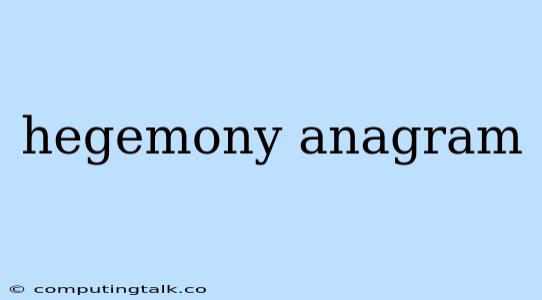The concept of hegemony, a term often associated with the Italian Marxist Antonio Gramsci, refers to the dominance or leadership of one group over others. It's not simply about brute force or military power, but also about the subtle ways in which a dominant group shapes the ideas, values, and beliefs of society, making its own interests seem natural and inevitable. This dominance can be exerted through various institutions like education, media, and culture.
However, the word anagram adds a twist to this concept. An anagram is a word or phrase formed by rearranging the letters of another word or phrase. This brings up the idea of hidden meanings, of how the same elements can be rearranged to create different interpretations and perspectives.
How does the idea of an anagram relate to hegemony?
One way to think about it is that hegemony, despite its apparent stability, can be seen as a fragile construct. It relies on maintaining a certain order, a specific arrangement of ideas and power. But like an anagram, this arrangement can be disrupted, rearranged, and reshaped.
Here are some ways to explore this concept further:
-
Can the power structures that create hegemony be seen as a kind of "anagram," where the letters represent different social groups, institutions, and ideologies? How might rearranging these elements lead to a different understanding of power dynamics?
-
How can marginalized voices and perspectives challenge hegemonic narratives by rearranging the "letters" of power? Can they offer new anagrams that reveal hidden truths and disrupt the dominant order?
-
What are the potential consequences of disrupting the hegemonic "anagram"? Could it lead to greater equality and social justice, or would it simply create new forms of domination?
The concept of hegemony and its potential to be disrupted by anagram offers a thought-provoking lens through which to examine the complexities of power, social structures, and the struggle for a more equitable world. It invites us to look beyond the surface of seemingly stable power dynamics and to consider the possibilities that emerge when we rearrange the "letters" of our social reality.
